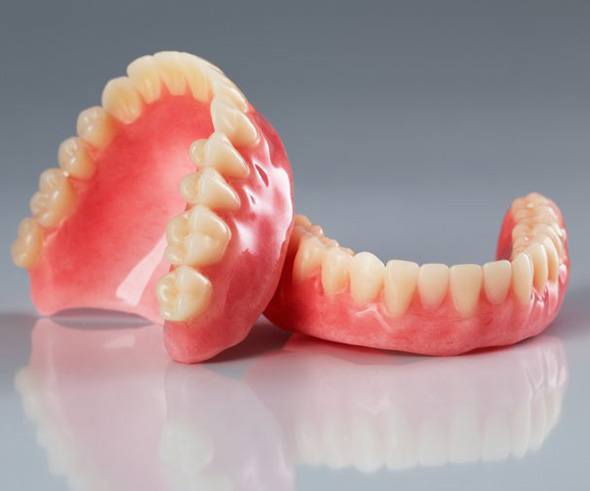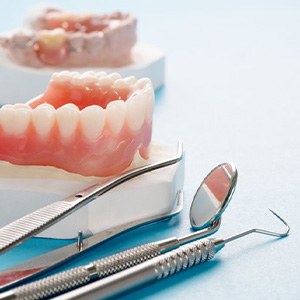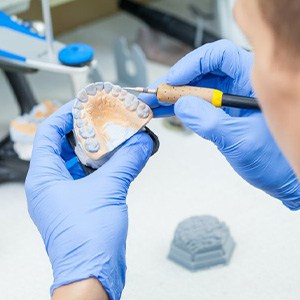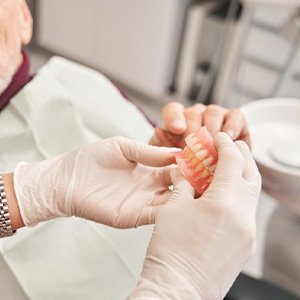Dentures Beaverton
A Traditional Tooth-Loss Solution
When it comes to ways to replace missing teeth, dentures have been a popular option for a very long time, and people continue to rely on them to this day. With fully customized dentures from Dr. Appelhans, you will be able to chew a variety of foods, speak clearly, and smile confidently even after extensive tooth loss. To learn more about dentures and find out whether they’re right for you, give our office a call today.
Why Choose Caring Smiles Dental for Dentures?
- Partnered with Local Dental Implant Specialists
- Highly Accurate Digital Impressions
- Friendly, Highly Personable Team
Who is a Good Candidate for Dentures?

Most people who have lost multiple teeth or an entire arch of teeth can be considered potential candidates for dentures. However, the only way to know for sure whether this form of tooth replacement is right for you is to schedule a consultation with our team. We’ll carefully examine your mouth and consider a variety of factors – such as the state of your jawbone and your overall oral health – before deciding whether you’re a good candidate for dentures.
Types of Dentures

Thanks to the many advancements in dentistry that have occurred over the years, today’s dentures are more lifelike and comfortable than ever. You might qualify for partial dentures, full dentures, or implant dentures based on your situation. Below is a closer look at the basics of each kind of denture.
Partial Dentures
A partial denture is made to fit snugly in the gaps where your missing teeth used to be. Metal clasps are used to keep the prosthesis anchored in place. The artificial teeth used to create your partial denture will look highly lifelike to the point where the average person won’t be able to tell the difference between them and your natural teeth.
Full Dentures
Full dentures sit directly on your gums in order to replace an entire row of missing teeth. You can count on well-fitted full dentures to stay in place thanks to natural suction. The base of your dentures will be made out of gum-colored acrylic, allowing it to look natural inside your mouth.
Implant Dentures
An implant denture is attached to a number of sturdy dental implant posts that have been placed directly into your jawbone. The stability of the dental implants means that you don’t have to worry about your prosthesis slipping out of place. On top of that, the stimulation from the implant posts can help prevent your jawbone from deteriorating as a consequence of tooth loss.
How Dentures Are Made

Your dentures will go through a rigorous customization process to ensure they compliment your smile perfectly. All told, it will take about two weeks or more for Dr. Appelhans and local dental lab technicians to craft your restoration. Once the final touches are made, you’ll have a full and comfortable grin! The best way to get things started is to contact our office and schedule a consultation.
What Are Dentures Made Of?

The base that will rest directly on top of your gums is typically made from quality acrylics. Though resin or nylon are sometimes used instead, acrylic is best able to mimic the appearance of a natural gumline.
The false teeth embedded in the base can also be made from resin, but many prefer porcelain because of its life-like shine. Porcelain is also incredibly smooth and durable, making for a comfortable choice.
Partial dentures often involve the same materials as full dentures. A metal clip, though, is added to help the restoration stay in place while it’s in your mouth.
The Denture Creation Process

Dr. Appelhans will take impressions of your mouth either during your consultation or following any preliminary procedures. He’ll also take precise notes about the shade you desire for the false teeth. To help ensure your dentures are aesthetically pleasing as possible, Dr. Appelhans will then send this information to a dental lab, where specialized technicians will fabricate your restoration. Several molds will be cast and re-cast in order to make sure your dentures will fit well, and once the technicians are satisfied with their work, they’ll deliver your dentures to our office.
When you visit for your final restoration, please don’t hesitate to tell us if something doesn’t sit quite right. It should only take us a couple of minutes to make any adjustments, and then you’ll have your dream smile!
Adjusting to Your New Dentures

New dentures might feel strange or even a bit uncomfortable at first. Most likely, this is simply because you’re not yet used to wearing them. However, if discomfort persists after a few weeks, give us a call so we can help fix the issue.
The Benefits of Dentures

If you’re a candidate for dentures, there are many reasons why it’s worth using them to replace your missing teeth as soon as possible:
- They will allow you to eat more kinds of foods than you would have been able to otherwise.
- They will enhance your ability to speak clearly.
- They will help preserve the youthful shape of your face.
- They can potentially last for many years as long as you take good care of them.
Dentures Aftercare

Once your dentures are in place, you will need to make sure you care for them properly if you want them to last as long as possible. Knowing what to do, what not to do, and when to seek professional help is important; it’s why our team at Caring Smiles Dental has provided a list of aftercare tips you can follow. After reviewing this information, we invite you to call our office if you have any questions.
Removable Dentures

Choosing removable dentures means committing to taking care of these prosthetics when they’re in and out of your mouth. Unlike implant dentures that are affixed and cannot be taken out, these teeth must be cared for differently.
Remove After Eating
Being able to eat a wider variety of foods can be an exciting experience, but it also means you must remember to remove your dentures immediately after a meal or snack. The reason is that food debris can become lodged between the denture and your gums, causing irritation over time. By removing your dentures, you can thoroughly clean your gums and any natural teeth as well as your prosthetic to ensure it is free of food and bad bacteria.
Clean Your Restoration
Cleaning your dentures at least twice a day (often more because of mealtimes) may require that you purchase a denture-specific brush, cleanser for soaking, and adhesive. If you apply any kind of powder, strip, or paste to your teeth to help hold them in place, you’ll need to make sure you remove it when taking your denture out. Using a soft-bristle brush and lukewarm water can be effective in ridding your teeth of harmful particles and ensuring they remain in the best possible shape.
Keep Your Dentures Safe
False teeth can be intriguing for little ones and four-legged friends, so if you want to avoid needing denture replacement, make sure to keep them up high and out of reach. You can use a protective case to keep them better protected, especially if they accidentally fall off the bathroom counter. It’s also helpful to keep a hand towel nearby to place in your sink when cleaning your dentures. This will cushion their fall if they accidentally slip out of your hands.
Remove Dentures When You Sleep
Part of caring for dentures means removing them at night before going to bed. Your gums and jawbone deliver continuous support to your artificial teeth throughout the day, so giving these areas of your mouth a chance to rest and retain valuable nutrients is essential. It’s also beneficial because it keeps your dentures moist instead of becoming brittle.
Notice Changes
While wearing dentures, you will begin to notice a change in how they feel. This occurs because of bone resorption – a condition that is the result of tooth loss and causing the jawbone to weaken over time since no tooth roots are stimulating it. As this happens, your teeth may begin to shift inside your mouth or even fall out while trying to eat or speak. If your dentures become uncomfortable or do not feel right, you’ll need to schedule an appointment with our team to discuss a possible reline.
Denture FAQs
How Long Will You Have to Wait to Get Dentures After Your Teeth are Pulled?
Traditionally it takes about six to eight weeks to get dentures after tooth extraction. However, the exact amount of time depends on the type of denture in question.
This wait time allows your gums the chance to heal, as well as any additional time needed to ensure that they fit properly.
If you’re getting implant dentures, you will need to wait between four to six months for the implant to join with the jawbone via a process called osseointegration.
Do Dentures Break Easily?
Although dentures are made of durable materials, they won’t last forever. Typically, you can expect them to last between five and seven years with proper care and use.
However, accidents can happen, and a common cause of broken dentures is dropping them while cleaning, inserting, or removing them. They can also break or fracture if they don’t fit properly or have tiny defects in the base such as scratches or notches.
Furthermore, even if you take excellent care of your dentures, they can still get worn down from use and stress.
Can I Reline My Dentures Myself?
In recent years social media has encouraged a lot of patients to try DIY denture relining. The idea behind this is that you can adjust your own restorations to ensure a better fit. Some stores and online retailers even sell denture reline kits.
The truth is that relining your dentures yourself isn’t a good idea. Only a trained dentist will have a qualified opinion as to how to properly fix ill-fitting dentures, and if you’re not careful, you can make them fit even worse than before!
You won’t have a good view if you perform a denture reline yourself. To truly grasp how to go about it, you need to see what you’re doing, which can’t happen with a DIY approach since you won’t have an outside perspective.
A DIY relining can also cause pain and make it harder to chew, especially when you don’t have the right tools to complete the job correctly.
Can I Sleep with My Dentures?
When you first get your new dentures, your dentist may recommend that you keep them in your mouth for the first 24 hours, including during sleep. However, after that, you should remove them every night before you go to bed.
Wearing dentures restricts the circulation in your gums, leading to soft tissue irritation and potentially speeding up ridge resorption. Removing your dentures at night gives your gums a chance to recover and get the nutrients they need while you sleep.
Furthermore, the dark moist space underneath your dentures is an ideal place for bacteria to thrive, and because of this sleeping with dentures has been associated with a higher risk of pneumonia.
Finally, poor oral hygiene and higher levels of gum and tongue plaque have also been associated with wearing dentures for too long.

